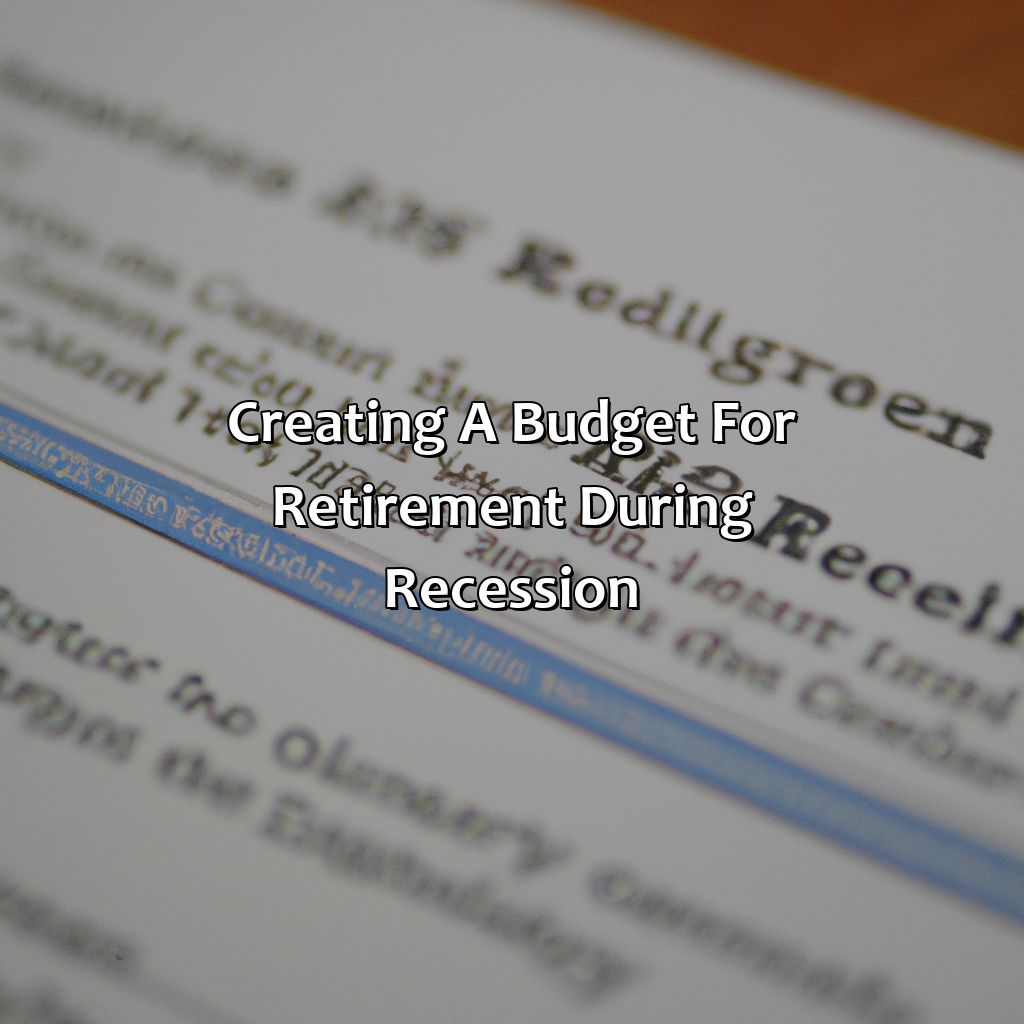How To Survive A Recession In Retirement?
Key Takeaway:
- Surviving a recession in retirement requires creating a budget that accounts for reduced income and increased expenses. This can involve downsizing and cutting back on discretionary spending in order to maintain financial stability.
- Alternative sources of income, such as part-time work or rental properties, can help supplement retirement funds during a recession. It’s important to weigh the potential risks and rewards of these options before making any decisions.
- Managing investments during a recession can be challenging, but it’s important to resist the urge to panic and sell off stocks. Instead, consider diversifying your portfolio and seeking advice from a financial professional.
Whether you’re retired or about to retire, you may be worried about how to survive a recession in retirement. While a recession can be difficult financially, there are smart steps you can take to protect your retirement savings and minimize the impact of the recession. Here are some tips on how to survive a recession in retirement.
Creating a budget for retirement during recession
Creating a Financial Plan for Retirement during Economic Downturns
During an economic recession, planning for retirement becomes increasingly important. Establishing a sound financial plan can help retirees manage their budget to prevent overspending and maintain their quality of life.
To start, allocate funds for essential expenses such as housing and health care. Cutting back on discretionary spending on entertainment and dining can reduce expenses. Additionally, retirees can examine their investments and develop a contingency plan to protect their assets.
One unique approach is to consider taking on part-time work or consulting gigs to supplement income and keep financial stability. This can also serve as a way to maintain social connections and stay active in the community.
Pro Tip: Consider working with a financial advisor to craft a tailored financial plan for retirement during a recession.

Image credits: retiregenz.com by James Arnold
Finding alternative sources of income
With the possibility of a recession looming, retirees must consider finding alternative revenue streams to supplement their retirement income. One way to achieve this is by exploring new investment opportunities, such as dividend-paying stocks or rental property. These options require upfront costs but can provide a steady income stream. Another alternative is taking advantage of freelance or consulting work, utilizing skills developed in previous careers. This can include writing, coaching or even part-time work. It’s crucial to develop a well-rounded strategy and not rely solely on one source of income to safeguard against a recession’s unpredictability.
Additionally, diversifying investments in different sectors, such as technology, healthcare, and consumer staples, can reduce risk and enhance long-term financial security. With the rise of online marketplaces, retirees can easily sell unused belongings, such as clothes, books, and electronics, for extra cash. Online surveys or focus groups can also provide opportunities for alternative income. Finally, retirees may consider downsizing to reduce monthly expenses and find financial freedom.
To stay financially secure in retirement, it’s important to stay adaptive and flexible, exploring alternative sources of income to mitigate the effects of a potential economic downturn. Don’t be afraid to get creative, seek out new opportunities, and build a well-rounded strategy. The fear of missing out on potential income could mean the difference between financial stability and insecurity during a recession.

Image credits: retiregenz.com by Harry Woodhock
Reducing expenses in retirement
Reducing Expenses in Retirement: Tips to Help You Survive a Recession
Reducing expenses in retirement is an important strategy for retirees to arm themselves with, especially during a recession. Here are some tips to consider:
- Cut down on your housing expenses by downsizing your home, renting out extra space, or even considering a reverse mortgage.
- Reduce your transportation expenses by downsizing to one vehicle and using public transportation or carpooling when possible.
- Look for ways to save on healthcare costs, such as shopping around for prescription drug prices, choosing a Medicare Advantage plan, or taking advantage of free preventative services.
One thing to keep in mind is that reducing expenses doesn’t necessarily mean sacrificing your quality of life. Rather, it’s about finding ways to make your retirement income last longer and work harder for you.
Have you heard about the couple who downsized from a four-bedroom house to a two-bedroom apartment? They were able to drastically reduce their housing expenses and put the savings towards their retirement fund. Finding creative ways to reduce expenses can make a significant impact on your financial well-being in retirement.

Image credits: retiregenz.com by Yuval Woodhock
Managing investments during recession
Managing Investments during Economic Downturn
Investors are bound to experience losses during a recession, especially those who have invested in the stock market. Unfortunately, the value of their investments may decline sharply, making it difficult for retirees to maintain their standard of living. In such situations, it is essential to manage investments efficiently.
Investors should seek expert advice and re-evaluate their investment portfolios by diversifying their investments across several asset classes. Investors should also consider investing in defensive sectors such as healthcare and consumer staples, which tend to perform better during an economic downturn.
Furthermore, investors should be patient and avoid making impulsive decisions. Frequent selling and buying of assets may lead to significant losses in the long run and create further complications in their portfolio.

Image credits: retiregenz.com by Harry Woodhock
Considering downsizing options
When it comes to exploring alternative living options in times of economic downturn during retirement, there are several options to consider. One of these is to explore the potential of downsizing your living situation. This could involve moving to a smaller home or apartment and selling off furniture and appliances that may no longer be necessary. By downsizing, you would be able to cut costs, reduce your expenses, and have more money available for emergencies, investments, or other essential expenses.
One aspect to keep in mind when considering downsizing is the potential psychological impact it could have on you. Moving from a larger home to a smaller one could be an overwhelming experience as you may need to adjust to living with less. It is important to stay in touch with your emotional needs and seek support or counseling if required.
It is possible that downsizing can bring a renewed sense of freedom and a feeling of new beginnings in a time when these may be needed. By decluttering your living space and creating a more streamlined living environment, you may find that your overall well-being and happiness improves.
When exploring downsizing options, it is important to do your research and seek out professional advice to ensure that you make the best choice for your current needs. Estate agents, financial advisors, or other experts in the field can provide guidance and support to help you make informed decisions.
A notable example to consider is the case of a retired couple who decided to sell their large house and move into a smaller apartment in the same locality. By doing so, they were able to reduce their living expenses, free up more funds to invest, and had more time and flexibility to enjoy their retirement. This is just one example of how downsizing can be an effective strategy to keep your finances under control during a recession.

Image credits: retiregenz.com by Joel Washington
Utilizing government assistance programs
The Role of Government Assistance Programs in Navigating Retirement during a Recession
During a recession, utilizing government assistance programs may be necessary to ensure a stable retirement. These programs can provide a safety net for those experiencing financial hardship.
For example, one option is Supplemental Security Income (SSI), which offers financial assistance for disabled and elderly individuals with limited income and resources. Medicaid can also help cover medical costs for those who meet eligibility criteria.
In addition, the Low Income Home Energy Assistance Program (LIHEAP) can provide assistance with heating and cooling costs, while the Senior Community Service Employment Program (SCSEP) can assist older individuals with finding employment opportunities.
Overall, these government assistance programs can help alleviate financial burdens during a recession. It is important to research and understand the available options to maximize their benefits.

Image credits: retiregenz.com by Yuval Woodhock
Seeking financial advice from professionals
It’s crucial to seek financial guidance from expert advisors to navigate through the recession in retirement. Professional advice can help assess risks, make informed investment decisions, and manage finances effectively. Advisors can recommend diverse portfolios, minimize fees and taxes, and ensure long-term financial stability. Their valuable insights can even help identify opportunities to benefit from the bearish market. Getting expert advisory can be a game-changer in surviving the recession and safeguarding retirement funds.
The professional advisory team helps retirees get the most out of their finances. It includes tax and estate planning specialists, investment advisors, and financial planners. Their collective experience and expertise help to tailor a financial plan that suits the unique needs of retirees. Advisors analyze the investment horizon, manage cash flows, and advise on risk-reward trade-offs. This approach enables retirees to make informed investment decisions and stay on track with their retirement goals.
It’s essential to note that seeking advice from advisors is not an expense, but an investment. It can ensure long-term financial stability, maximize retirement income, and mitigate market risks. A diversified financial plan can provide a sense of security and avoid the fear of running out of money. Retirees who follow expert advice are more likely to thrive in their retirement years and enjoy financial freedom.
In these uncertain times, it’s critical to stay financially educated and informed. Retirees can take control of their financial situation by seeking advice from professional advisors. They can guide them to make informed decisions, manage risks, and safeguard retirement funds. Don’t let the fear of missing out on expert advice stop you from securing your financial future. Seek professional guidance and prepare for a financially secure retirement.

Image credits: retiregenz.com by Joel Woodhock
Coping strategies to manage stress and anxiety
Coping with Stress and Anxiety During a Financial Downturn
In times of financial downturns, managing stress and anxiety becomes crucial for retirees. Here are some coping strategies to help you stay calm and focused during tough times:
- Take care of your physical health by exercising, eating healthy, and getting enough sleep.
- Stay connected with friends and family for emotional support.
- Engage in activities that bring you joy and a sense of purpose, such as volunteering or hobbies.
- Practice mindfulness and meditation to help reduce anxiety and improve mental clarity.
- Create a daily routine and stick to it to maintain a sense of structure and control.
- Seek professional help if needed, such as therapy or counseling.
Remember, you are not alone in facing financial challenges during retirement. Stay informed and take action where you can to improve your financial situation.
Pro Tip: Avoid excessive worrying by focusing on what you can control and taking small steps towards your goals.

Image credits: retiregenz.com by James Arnold
Five Facts About How To Survive a Recession in Retirement:
Diversify your portfolio to include a mix of stocks, bonds, and cash equivalents. (Source: Investopedia)
Consider reducing your expenses and creating a budget to make your retirement savings last longer. (Source: AARP)
Don’t panic and make hasty investment decisions, instead consult with a financial advisor to navigate the market volatility. (Source: Forbes)
Consider delaying Social Security benefits until you reach age 70 to maximize your payouts. (Source: Kiplinger)
Look for ways to generate additional income, such as taking on part-time work or renting out a spare room. (Source: U.S. News & World Report)
FAQs about How To Survive A Recession In Retirement?
What is a recession and how does it affect retirement?
A recession is a period of economic decline, where there is a drop in GDP, employment rates, and a general slowdown in economic activity. Recession can have a significant impact on the financial stability of retirees as they rely on their savings and investments to make ends meet.
How to prepare for a recession during retirement?
It is essential to prepare for a potential recession during retirement. Here are a few steps you can take to safeguard your finances:
– Review your expenses and reduce them wherever possible
– Ensure necessary insurance coverage is in place to protect your assets
– Consider diversifying your investment portfolio
– Consult with a financial planner to adjust your retirement strategy
How can retirees reduce their expenses during a recession?
To reduce expenses during a recession, retirees can take the following steps:
– Cut unnecessary expenses like subscriptions and memberships
– Consider downsizing or renting out extra space
– Cook meals at home instead of dining out
– Shop for deals and discounts on groceries and household goods
– Increase energy efficiency by sealing drafts and turning off electronics when not in use
How can retirees generate income during a recession?
Retirees can consider generating income in the following ways:
– Work part-time or start a home-based business
– Rent out a property or room
– Sell unneeded items online or at a yard sale
– Consider a reverse mortgage
– Invest in dividend-paying stocks or funds
Is it a good idea to withdraw retirement funds during a recession?
Withdrawing retirement funds during a recession is not typically a good idea, as it can present tax implications and jeopardize the sustainability of your retirement portfolio. If you must withdraw funds, consult with a financial advisor and consider the long-term impact on your retirement strategy.
What resources are available for retirees during a recession?
Resources available to retirees during a recession include:
– Social Security and Medicare
– Unemployment benefits
– Government assistance programs
– Community resources like food banks and senior centers
– Financial counseling from nonprofit organizations
 Checkout this IRS Loophole
Checkout this IRS Loophole 




